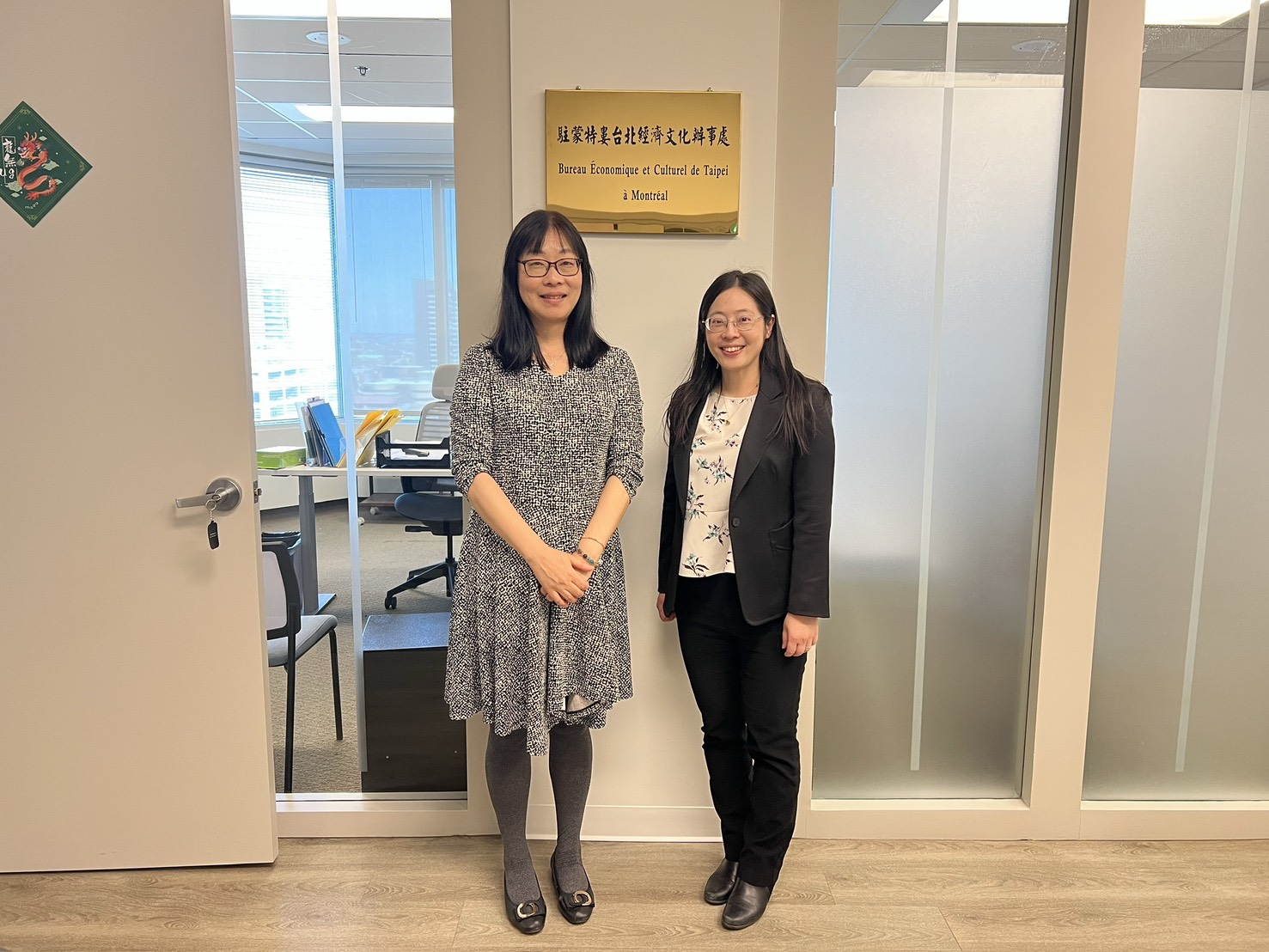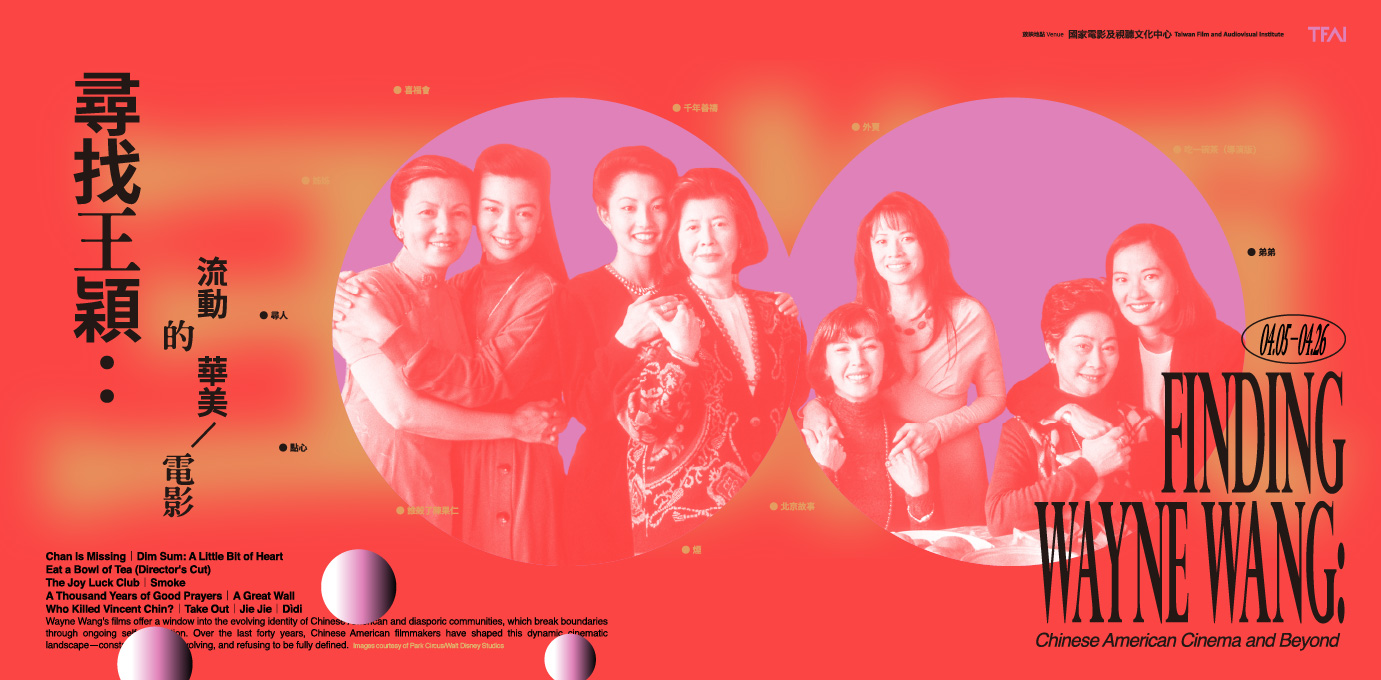
活動訊息EXHIBITION AND EVENT INFORMATION
-
 MORE
MORE -
.jpg) MORE
MORETaiwan Film and Audiovisual Institute Brings The Story of a Small Town and PAI Ching-jui Retrospective to the Far East Film Festival
The Taiwan Film and Audiovisual Institute (TFAI) returned to the Far East Film Festival (FEFF) with a showcase of restored Taiwanese cinema, featuring the international premiere of The Story of a Small Town, which was part of the festival’s Restored Classics program. This newly restored work by director LEE Hsing, supported by the Hakka Public Communication Foundation, represents a key milestone in Taiwanese film restoration. In addition, the festival presented a special Tribute to PAI Ching-jui, premiering three of the iconic director’s newly restored classics: Lonely Seventeen (1968), Accidental Trio (1969), and Good Bye! Darling (1970). The audience responded with great enthusiasm—laughing, applauding, and embracing the distinct charm of Taiwanese classics on the big screen. Recognized as a major gateway for Asian genre films into Europe, FEFF is also a long-standing supporter of the preservation and rediscovery of Asian cinematic heritage. Since 2018, TFAI has collaborated closely with FEFF, which has also featured restored Taiwanese works for eight consecutive years. In 2025, a record nine Taiwanese films, both restored and contemporary, were selected for the festival. Of those, four titles were presented by TFAI—further cementing the strong partnership between the two organizations. TFAI Chairman Arthur CHU attended the festival to underscore the Institute’s ongoing commitment to international cultural exchange. Prior to the screening, CHU introduced the Institute’s latest restoration efforts and Taiwan’s rich cinematic legacy to an international audience. He noted that The Story of a Small Town had just celebrated its world premiere in March during TFAI’s anniversary event, and expressed great pride in bringing the film to Italy only a month later. CHU also shared insights into the challenges behind the restoration process: "The Story of a Small Town was one of the most technically demanding projects our team has ever undertaken," he said. The original film elements were in poor condition—plagued not only by common issues such as stains, scratches, and dust, but also by widespread mold that caused severe flickering and color distortion throughout the footage. Additionally, the reel suffered from vinegar syndrome and warping, requiring the restoration team to push the current restoration technology to its very limits. CHU noted that the film also captures a microcosm of Taiwanese society toward modernization. Through cinematic imagery, it presents valuable snapshots of history, offering audiences a glimpse into how Taiwan gradually emerged as a key player in the global industry. CHU went on to highlight the significance of this year’s Tribute to PAI Ching-jui. Beyond showcasing TFAI’s latest restoration achievements, the selected works reflect PAI’s deep personal and artistic ties to Italy. “PAI studied in Italy, and his work was deeply influenced by Italian neorealism,” said CHU. “This retrospective holds far more meaning than simply sharing his films with Italian and global audiences.” The audience was especially responsive to PAI’s bold visual style, expressing astonishment at the avant-garde nature of his work during its time. The presentation of PAI’s films and LEE Hsing’s The Story of a Small Town at FEFF offers a compelling contrast. Though close friends and university classmates, the two directors developed distinct cinematic voices. PAI’s work, in particular, explores the tensions between commercial pressures, personal expression, and the constraints of censorship during Taiwan’s martial law era. His films serve as a vivid reflection of the complexities faced by filmmakers during that period. With this initiative, TFAI continues its mission to engage in meaningful cultural exchange through Taiwan’s most exemplary audiovisual works—fostering dialogue with international filmmakers and institutions, and deepening Taiwan’s cultural impact on the global stage -
 MORE
MOREBFI curates a Taiwan New Cinema season and invites directors Chen Kun-hou and Huang Yu-shan to show their classics with UK audiences
In partnership with Taiwan Film and Audiovisual Institute, the Cultural Division of the Taipei Representative Office in the UK and the British Film Institute (BFI) collaborate on a new season titled ‘Myriad Voices: Reframing Taiwan New Cinema.’ Opening on March 31, the season introduces the Taiwan New Cinema classics to the UK audiences, and directors Chen Kun-hou and Huang Yu-shan will attend the events in London. The season curator Hyun Jin Cho expresses, ‘Finding presence somewhere between the unresolved past and the inescapable pull of the future, Taiwan New Cinema offers a blend of insight, candor, and delicate lightness.’ Even until today, these films not only resonate with the audiences but prompt them to reflect upon what they perceive in the films. Therefore, after the success of The Films of Edward Yang: Conversations with a Friend held earlier in February at BFI, another season is curated to show the UK audiences the works of other Taiwanese filmmakers who are contemporary with Edward Yang. The season, Myriad Voices: Reframing Taiwan New Cinema, will be held from March 31 to April 30 at BFI Southbank, showing 15 films in more than 30 screenings. These films include Hou Hsiao-hsien’s A City of Sadness, A Time to Live and a Time to Die, and The Boys from Fengkuei, Edward Yang’s The Terrorizers, Taipei Story, and Duckweed, Chen Kun-hou’s Out of the Blue and My Favorite Season, Chang Yi’s Kuei-mei, a Woman, and This Love of Mine, Huang Yu-shan’s Autumn Tempest, Wan Jen’s Ah Fei, and Wang Toon’s Strawman. In addition, there are In Our Time and The Sandwich Man, both co-directed by several renowned filmmakers. ➤In partnership with Taiwan Film and Audiovisual Institute, the Cultural Division of the Taipei Representative Office in the UK and the British Film Institute (BFI) collaborate on a new season titled ‘Myriad Voices: Reframing Taiwan New Cinema.’ (photo courtesy of the Ministry of Culture) Golden Horse Lifetime Achievement Award winner Chen Kun-hou and director Huang Yu-shan are invited to the events in London to meet the UK audiences. Chen Kun-hou will do the introduction to The Boys from Fengkuei and attend the post-screening Q&A sessions on Out of the Blue and My Favorite Season. Huang Yu-shan will participate in the post-screening Q&A session on Autumn Tempest and deliver a speech on the development of the Taiwanese film industry in the 1980s from feminist perspectives at the Taiwan New Cinema Symposium on April 12. This season is supported by Taiwan Film and Audiovisual Institute, which took part in film selection and screening licensing. It is anticipated that audiences in the UK will be able to experience and appreciate the unique narrative charm and cultural significance embodied in Taiwan New Cinema. For more information on Myriad Voices: Reframing Taiwan New Cinema, please go to BFI website: Myriad Voices: Reframing Taiwan New Cinema | BFI Southbank -
 MORE
MOREThe Joy Luck Club director Wayne Wang to appear at TFAI in April for “Finding Wayne Wang: Chinese American Cinema and Beyond”, a celebration of Chinese filmmakers in Hollywood
In the past, Chinese characters in American films might have had kung fu skills like Bruce Lee, possessed “mysterious Oriental powers,” been portrayed as treacherous and cunning, run a laundry shop, or served as comic relief. For many years, Asian filmmakers in Hollywood have tried to break through and overturn these ethnic stereotypes on the big screen. This April, the Taiwan Film & Audiovisual Institute (TFAI) presents “Finding Wayne Wang: Chinese American Cinema and Beyond”, a themed program that invites pioneering Chinese American director Wayne Wang to Taiwan, guiding audiences through his body of work to explore how the emerging narratives of diverse ethnic communities have found their voice. ➤ Wayne Wang (right) was born in Hong Kong and grew up in a traditional Chinese family. After studying in the US, he completed his first feature film in San Francisco’s Chinatown. Behind-the-scenes photo from Chan Is Missing. (Photo by Nancy Wong) From Ang Lee’s The Wedding Banquet (1993) to new-generation filmmaker Jon M. Chu’s Crazy Rich Asians (2018) and Daniel Kwan’s Everything Everywhere All at Once (2022), films by Chinese American directors have continued to make waves on the global stage. However, before these filmmakers rose to prominence, Wayne Wang from Hong Kong had already made his mark in the US during the 1980s. Born in Hong Kong to a traditional Chinese family, Wayne Wang moved to the US in his teens to study and later made his way to San Francisco’s Chinatown for work and to collect Chinese stories. Eventually, on an extremely low budget, he made Chan Is Missing (1982), America’s first theatrically released feature film about Chinese American experiences directed by a Chinese filmmaker. He later shot to fame with The Joy Luck Club (1993), establishing himself as a pioneer of Chinese American cinema. ➤Wayne Wang’s breakthrough film, The Joy Luck Club, traces the family memories of Chinese immigrants. (Courtesy of Park Circus/Walt Disney Studios) TFAI’s April program, “Finding Wayne Wang: Chinese American Cinema and Beyond,” showcases the diversity and complexity of Chinese American communities through a curated selection of films, with Wayne Wang himself coming to Taiwan to participate in a range of talks and Q&As. Wayne Wang’s films often revolve around cultural collisions between East and West, interethnic integration, and the joys and hardships of immigrant life; they are explorations of self-identity, as well as inquiries into the essence of the self. His debut feature, Chan Is Missing, tells the story of taxi driver Jo, whose search through the streets of San Francisco for his missing friend Chan inadvertently uncovers a financial and political scandal in Chinatown. Utilizing a noir-style suspense narrative, the film delicately captures the real feel of Chinatown, earning praise from The New York Times upon its release, and was later selected for preservation in the US National Film Registry by the Library of Congress. ➤Chan Is Missing is the first theatrically released feature film in the US directed by a Chinese filmmaker that centers on Chinese American experiences. Photo of actor Peter Wang. (Courtesy of TFAI) ➤Wayne Wang’s debut feature, Chan is Missing, authentically captures San Francisco’s Chinatown in the 1980s. (Courtesy of TFAI) Chan Is Missing, Dim Sum: A Little Bit of Heart (1985), and Eat a Bowl of Tea (1989) form Wayne Wang’s “Chinatown Chronicles”, establishing his unique narrative style and thematic focus on familial relationships. In the 1990s, he received backing from Disney to direct The Joy Luck Club, an award-winning film with a predominantly Asian cast and crew that tenderly portrays the family memories of Chinese immigrants. Even three decades later, the film resonates deeply with Asian audiences familiar with the pressure to meet parental expectations. The film’s mother-daughter dialogue, such as “Should eat more! Too skinny!” and “Well, I thought you said I was getting fat,” remains iconic. Through the subtleties of these character interactions and the revelation of their values, Wayne Wang delivers a nuanced and authentic portrayal of Asian American communities. ➤“Finding Wayne Wang: Chinese American Cinema and Beyond” will screen Wayne Wang’s trilogy “Chinatown Chronicles”. Still shot from Dim Sum: A Little Bit of Heart. (Courtesy of TFAI) This program features screenings of representative works from different periods of Wayne Wang’s career, including Smoke (1995), which deliberately moved away from Chinese American subjects and won an award at Berlinale, as well as A Thousand Years of Good Prayers (2007), which marked his return to independent productions after working within the Hollywood studio system. Additionally, the program includes numerous Chinese American films that echo Wayne Wang’s works, such as the Oscar-nominated documentary Who Killed Vincent Chin? (1987); A Great Wall, an autobiographical piece by renowned writer and Chan is Missing actor Peter Wang that captures everyday life in old Beijing; Take Out, co-directed by Taiwanese filmmaker Tsou Shih-ching and Sean Baker, the Oscar-winning director of Anora, which depicts survival stories of undocumented migrants in New York; and the back-to-back screenings of Sean Wang’s Didi (2024) and Feng-i Fiona Roan’s Jie Jie (2018), both of which come from new-generation filmmakers and explore an adolescent's inner struggles and deep yearning for understanding that come with growing up in an immigrant family. ➤“Finding Wayne Wang: Chinese American Cinema and Beyond” will screen representative works from different periods of Wayne Wang’s career. Still shot from Smoke, which deliberately avoids Chinese themes. (Courtesy of TFAI) ➤Wayne Wang’s filmmaking career spans both the independent film and Hollywood studio systems. Behind-the-scenes photo with South Korean actress Jun Ji-hyun from the set of Snow Flower and the Secret Fan. (Courtesy of TFAI) During the program period, directors Wayne Wang and Peter Wang will personally attend many of the screenings to participate in talks and Q&As, while Take Out actor Johnny Yu will be present to introduce the film at its first-week screening. Moreover, Wayne Wang will deliver a masterclass on the evening of April 18, in which he will discuss the selected films, share his invaluable insights from working in both the US independent film and Hollywood studio systems, and talk about his experiences collaborating with stars such as Harvey Keitel, Gong Li, Natalie Portman, and Jennifer Lopez. Finding Wayne Wang: Chinese American Cinema and BeyondDates: April 5 to April 26Tickets: https://www.tfai.org.tw/en/program/seriesList/2c9680829428366a01957f25a6840298 -
MORE
Taiwan Film and Audiovisual Institute presents Taiwan New Cinema classics at Cinemateca Portuguesa in Portugal
Last year, Taiwan Film and Audiovisual Institute (TFAI) collaborated with Taipei Economic and Cultural Office in Spain and Taipei Economic and Cultural Centre in Portugal on 'King Hu & Taiwanese Martial Arts Film Festival' at Cinemateca Portuguesa. Since it received overwhelmingly positive feedback, this year, Cinemateca Portuguesa initiated a Taiwan New Cinema film festival titled 'Revisitar o Cinema Novo de Taiwan', on which they work with the programmer Nuno Sena and Taipei Economic and Cultural Centre in Portugal. 'Taiwan New Cinema' is a film reform movement started by a group of Taiwanese filmmakers more than forty years ago. They hoped that their films, which were close to the lives of ordinary people and shot in a realistic style, would resonate with the audiences. The leading figures of the movement include the renowned directors Hou Hsiao-hsien and Edward Yang. The movement not only created legends and endowed Taiwan with an important cultural legacy but catapulted Taiwanese cinema onto the international stage. 'Revisitar o Cinema Novo de Taiwan' introduces the diversity and the filmmakers of New Taiwan Cinema to the audiences outside Taiwan. At the screening of the opening film, In Our Time, Chang Tsung-che, the representative of Taipei Economic and Cultural Centre in Portugal, greeted the audience with Taiwanese glove puppets that symbolized the Taiwanese culture. Chang expressed that through cinema, people around the world could get to see the different aspects of Taiwan and he hoped that in the future, there would be more opportunities of showing Taiwanese culture to the world. 'Revisitar o Cinema Novo de Taiwan' takes place from 5th to 21st of June, showing the nine highly representative films screened in the program, 'Taiwan New Cinema: Revisited,' held at TFAI in 2022. They include four classics, Dust in the Wind (digitally restored), In Our Time (digitally restored), My Favorite Season (digitally restored) and Strawman (Taiwanese-language version) directed by masters such as Hou Hsiao-hsien, Edward Yang, Chen Kun-hou and Wang Toon. In addition, Girls’ School (digitally restored) by the first Taiwanese female commercial director Lee Mimi, Kendo Kids, Ah Fu, The Digger. The Suona Player and The Two of Us (digitally restored) are selected. Meanwhile, TFAI invited Lee You-ning, the director of The Two of Us, to Portugal. The film script was written by the celebrated Taiwanese scriptwriter Wu Nien-jen in the 1980s, and it won Wu Best Adapted Screenplay at the Golden Horse Awards. The theme song, Song of Another Somebody, was performed by Lee Shou-chuan; the tender melody and the sincere lyrics made the song a big hit at the time and its popularity has remained ever since. Director Lee attended the pre-screening introduction and the post-screening Q&As; sharing the making of The Two of Us with the local audience, Lee explained that the script was inspired by a story in the newspaper and how the film reflected the social and economic situation in Taiwan at that time. He expressed, 'Having met the Cinemateca Portuguesa staff and the overseas audiences in person, I truly feel the passion and the strong sense of mission of all those involved in this festival. I'm very happy and moved.' In 2020, TFAI restored Girls' School directed by Lee Mimi. Through the screenings of the film all over the world, TFAI demonstrates its professionalism and ability to restore films and its ample energy as an international film archive and restoration institute. Cinemateca Portuguesa is one of the important pioneer film archives in Europe and a leader in film archive and restoration. Like TFAI, Cinemateca Portuguesa is dedicated to collecting, preserving and promoting the cultural legacy of moving pictures and raising public understanding of the history of cinema, regarding the development of film and audiovisual culture as their commission. Miranda Chuang, Director of Promotion and Cooperation at TFAI, says, 'TFAI screened the martial arts films in Portugal last year and this year, we introduce Taiwan New Cinema to the Portuguese audiences. These films play a very important role in the history of Taiwanese cinema. This collaboration is helpful in promoting Taiwanese films in Portugal and increasing the cultural exchange between Taiwan and Portugal. In the future, TFAI will continue collaborating with Cinemateca Portuguesa in different aspects. We hope that through our collaboration, we will increase the influence as well as the visibility of Taiwanese cinema on the international stage and promote the international cooperation and exchange between different film cultures.' ➤ REVISITAR O CINEMA NOVO DE TAIWAN initiated by Cinemateca Portuguesa. From left to right: Miranda Chuang (Director of Promotion and Cooperation at TFAI), Nuno Sena (Revisitar o Cinema Novo de Taiwan programmer), Lee You-ning (director) and Wu Chen-yi (Head of Department of International Cooperation at TFAI) -----REVISITAR O CINEMA NOVO DE TAIWAN Place: Cinemateca Portuguesa Date: 5 – 21 June For more details: https://www.cinemateca.pt/programacao.aspx?ciclo=1783
